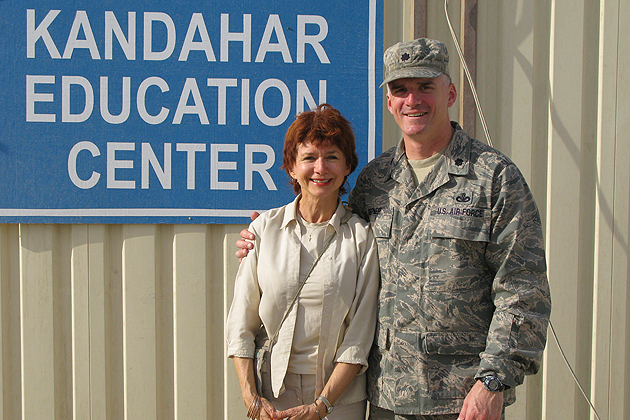
During my final year at UConn, I did two things: I took “Law and Society” with Professor Ridgeway Davis and promised myself that, if I made an A, I would apply to law school. And just in case, I also took the minimum number of classes required for a teaching certificate.
I got the A and the teaching credential and taught part time for two years before heading to UConn Law, where I studied international law and served as president of the International Law Society, thinking I might return to Japan, the land of my childhood. I turned down an offer to join the Judge Advocate General Corps (JAG) so that my son, Erik Goepner ’89 (CLAS), could have an all-American childhood. I went to work as a staff attorney for the Connecticut General Assembly, where I spent much of my time educating legislators on how the state’s bail bond system worked.
Several years later, armed with his own UConn degree, in political science—including credits in that same class with Professor Davis—Erik planned to take Capitol Hill by storm, perhaps as a legislative aide. He worked on Lowell Weicker’s 1990 gubernatorial campaign, running errands and drafting white papers, before making the rounds in D.C.
Capitol Hill did not beckon, however, so Erik found his route to government service through a military career. His role models were his two grandfathers, who had fought on opposite sides in World War II. My father was a Navy chaplain in the Pacific, and Erik’s Opa fought with Field Marshall Erwin Rommel in North Africa, winning the Iron Cross for bravery.
Now an Air Force colonel, Erik likes to say he has had the best career in the world. He has worked hard, has been steadily promoted, met his beautiful wife, Nancy, and earned two master’s degrees, one in organizational studies and the other in military operational art and science, all thanks to the Air Force.
Meanwhile, teaching offered me a way home. I taught for two years at an international school in the Philippines, and my daughter, Clara, and I spent vacations with Erik, who was by then a captain in the United States Air Force, stationed in Japan. Later, I was recruited by the Department of Defense Dependents Schools to teach the children of active-duty military members at Lajes Field, Azores, in Portugal.
I also taught evening classes for the University of Maryland University College (UMUC) and last year was granted a leave of absence to teach full time at the Army Education Center at Kandahar Air Field (KAF), Afghanistan. UMUC has been teaching armed forces members since 1949, and in 2005 became the first to hold classes downrange.

Last fall, it all came together. Erik was serving as commander of the Provincial Reconstruction Team in Afghanistan’s Zabul Province, a mere 45 minutes from KAF as the Chinook flies. He was building schools and helping the Afghan government find its footing, while I was teaching government and writing to the soldiers who shipped and repaired the equipment and supplies that sustained his team.
Teaching in a combat zone is like teaching anywhere, sort of. Students stash their stuff (M-4 rifles) where the teacher can trip on it. Sometimes they miss a class—but can’t tell the teacher where they’d been. They write narrative essays about interesting experiences, such as their wild ride from Kuwait to join the Iraq invasion. Their mission, of course, lies outside the classroom. The way I see it, they are keeping our country safe for everyone who wants to study full time.
Proximity notwithstanding, the mission comes before Mom, and I saw Erik only once, when he redeployed through KAF on his way home. His going-away gift was a referral to the command sergeant major at Forward Operating Base Apache, Christopher Martinez, who really wanted his infantrymen to go to college last winter.
Erik and I are both still working in education, and Clara may follow soon. For the next year, he will be sharing lessons learned in counterinsurgency with members of a Washington, D.C., think tank, most of whom have never been downrange, while in turn learning from policymakers. After years of deployments throughout the Middle East, he will have a year at home with Nancy and my grandchildren, Rachel, Josh, and Daniel.
I plan to teach forever, but even when I finally leave the board markers and textbooks behind, I expect I will still be informing anyone who will listen that U.S. military members are American’s finest—inside and outside the classroom.
Angela Grant ’73 (CLAS), ’77 JD is a Department of Defense Dependents Schools teacher presently assigned to Bahrain School. Her son, Col. Erik Goepner, USAF, ’89 (CLAS), has been selected as a 2011-2012 Military Fellow with the Center for Strategic and International Studies in Washington, D.C.



